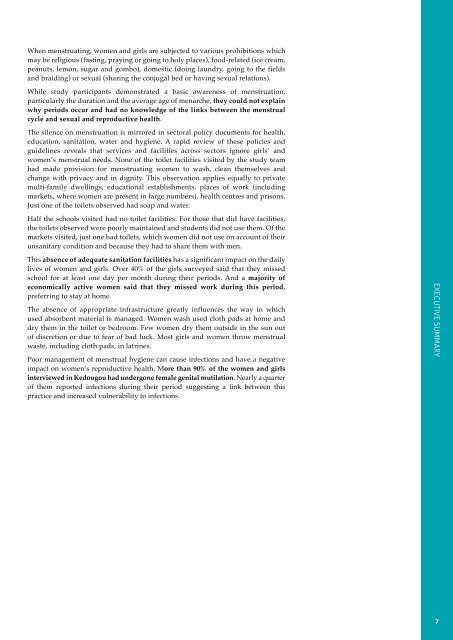1wE4FuZ
1wE4FuZ
1wE4FuZ
Create successful ePaper yourself
Turn your PDF publications into a flip-book with our unique Google optimized e-Paper software.
When menstruating, women and girls are subjected to various prohibitions whichmay be religious (fasting, praying or going to holy places), food-related (ice cream,peanuts, lemon, sugar and gombo), domestic (doing laundry, going to the fieldsand braiding) or sexual (sharing the conjugal bed or having sexual relations).While study participants demonstrated a basic awareness of menstruation,particularly the duration and the average age of menarche, they could not explainwhy periods occur and had no knowledge of the links between the menstrualcycle and sexual and reproductive health.The silence on menstruation is mirrored in sectoral policy documents for health,education, sanitation, water and hygiene. A rapid review of these policies andguidelines reveals that services and facilities across sectors ignore girls’ andwomen’s menstrual needs. None of the toilet facilities visited by the study teamhad made provision for menstruating women to wash, clean themselves andchange with privacy and in dignity. This observation applies equally to privatemulti-family dwellings, educational establishments, places of work (includingmarkets, where women are present in large numbers), health centres and prisons.Just one of the toilets observed had soap and water.Half the schools visited had no toilet facilities. For those that did have facilities,the toilets observed were poorly maintained and students did not use them. Of themarkets visited, just one had toilets, which women did not use on account of theirunsanitary condition and because they had to share them with men.This absence of adequate sanitation facilities has a significant impact on the dailylives of women and girls. Over 40% of the girls surveyed said that they missedschool for at least one day per month during their periods. And a majority ofeconomically active women said that they missed work during this period,preferring to stay at home.The absence of appropriate infrastructure greatly influences the way in whichused absorbent material is managed. Women wash used cloth pads at home anddry them in the toilet or bedroom. Few women dry them outside in the sun outof discretion or due to fear of bad luck. Most girls and women throw menstrualwaste, including cloth pads, in latrines.Poor management of menstrual hygiene can cause infections and have a negativeimpact on women’s reproductive health. More than 90% of the women and girlsinterviewed in Kedougou had undergone female genital mutilation. Nearly a quarterof them reported infections during their period suggesting a link between thispractice and increased vulnerability to infections.Executive Summary7



